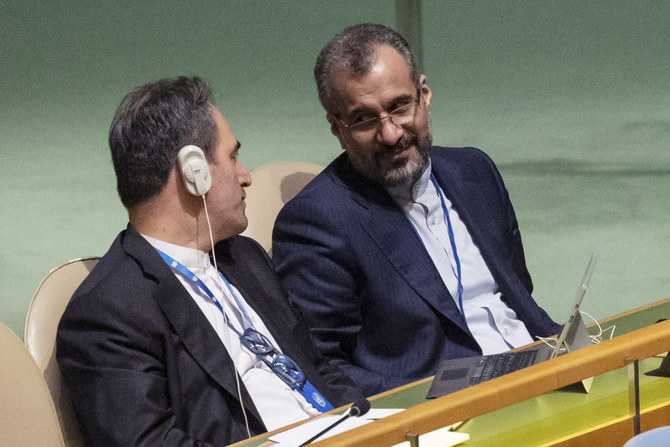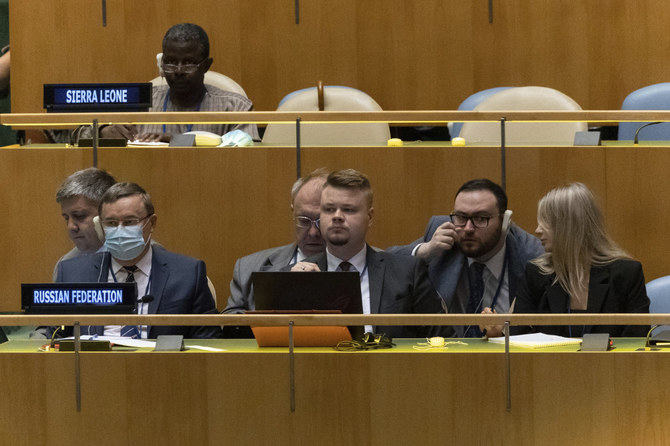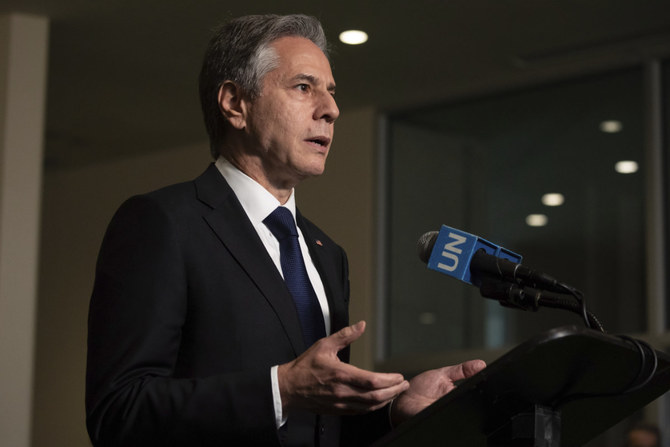UNITED NATIONS: The United Nations chief warned the world Monday that “humanity is just one misunderstanding, one miscalculation away from nuclear annihilation,” citing the war in Ukraine, nuclear threats in Asia and the Middle East and many other factors.
Secretary-General Antonio Guterres gave the dire warning at the opening of the long-delayed high-level meeting to review the landmark 50-year-old treaty aimed at preventing the spread of nuclear weapons and eventually achieving a nuclear-free world.
The danger of increasing nuclear threats and a nuclear catastrophe was also raised by the United States, Japan, Germany, the UN nuclear chief and many other opening speakers at the meeting to review progress and agree to future steps to implement the Nuclear Nonproliferation Treaty, known as the NPT.
US Secretary of State Antony Blinken said North Korea is preparing to conduct its seventh nuclear test, Iran “has either been unwilling or unable” to accept a deal to return to the 2015 nuclear agreement aimed at reining in its nuclear program, and Russia is “engaged in reckless, dangerous nuclear saber-rattling” in Ukraine.
He cited Russian President Vladimir Putin’s warning after its Feb. 24 invasion that any attempt to interfere would lead to “consequences you have never seen,” emphasizing that his country is “one of the most potent nuclear powers.”
This is contrary to assurances given to Ukraine of its sovereignty and independence when in gave up its Soviet-era nuclear weapons in 1994, Blinken said, and sends “the worst possible message” to any country thinking it needs nuclear weapons to defend itself and deter aggression.
Japan’s Prime Minister Fumio Kishida said divisions in the world since the last review conference in 2015, which ended without a consensus document, have become greater, stressing that Russia’s threat to use nuclear weapons in the Ukraine war has contributed “to worldwide concern that yet another catastrophe by nuclear weapon use is a real possibility.”
Germany’s Foreign Minister Annalena Baerbock accused Russia of “brutally violating the assurances” it gave Ukraine in 1994 and said Moscow’s “reckless nuclear rhetoric” since its invasion of its smaller neighbor “is putting at risk everything the NPT has achieved in five decades.”
Most recently, Blinken said Russia seized Europe’s largest nuclear power plant in Zaporizhzhya and is using it as a military base to fire at Ukrainians, “knowing that they can’t and won’t shoot back because they might accidentally strike a nuclear reactor or highly radioactive waste in storage.” He said this brings the notion of having “a human shield to an entirely different and horrific level.”
International Atomic Energy Agency Director General Rafael Grossi said the Ukraine conflict is “so grave that the specter of a potential nuclear confrontation, or accident, has raised its terrifying head again.”
He warned that at the Zaporizhzhya nuclear plant “the situation is becoming more perilous by the day,” and he urged all countries to help make possible his visit to the plant with a team of IAEA safety and security experts, saying his efforts for the past two months have been unsuccessful.
Guterres told many ministers, officials and diplomats gathered in the General Assembly Hall that the month-long review conference is taking place “at a time of nuclear danger not seen since the height of the Cold War.”
The conference is “an opportunity to hammer out the measures that will help avoid certain disaster, and to put humanity on a new path toward a world free of nuclear weapons,” the secretary-general said.
But Guterres warned that “geopolitical weapons are reaching new highs,” almost 13,000 nuclear weapons are in arsenals around the world, and countries seeking “false security” are spending hundreds of billions of dollars on “doomsday weapons.”
“All this at a time when the risks of proliferation are growing and guardrails to prevent escalation are weakening,” he said, “And when crises — with nuclear undertones — are festering from the Middle East and the Korean Peninsula to the invasion of Ukraine by Russia, and to many other factors around the world.”
Guterres called on conference participants to take several actions: urgently reinforce and reaffirm “the 77-year-old norm against the use of nuclear weapons,” work relentlessly toward eliminating nuclear weapons with new commitments to reduce arsenals, address “the simmering tensions in the Middle Est and Asia” and promote the peaceful use of nuclear technology.
“Future generations are counting on your commitment to step back from the abyss,” he implored the ministers and diplomats. “This is our moment to meet this fundamental test and lift the cloud of nuclear annihilation once and for all.”
Japan’s Kishida, recalling his home city of Hiroshima where the first atomic bomb was dropped in August 1945, echoed many of Guterres’ points saying the path to a world without nuclear weapons has become harder but “giving up is not an option.”
In force since 1970, the Nonproliferation Treaty known as the NPT has the widest adherence of any arms control agreement, with some 191 countries that are members.
Under its provisions, the five original nuclear powers — the United States, China, Russia (then the Soviet Union), Britain and France — agreed to negotiate toward eliminating their arsenals someday and nations without nuclear weapons promised not to acquire them in exchange for a guarantee to be able to develop nuclear energy for peaceful purposes.
India and Pakistan, which didn’t join the NPT, went on to get the bomb. So did North Korea, which ratified the pact but later announced it was withdrawing. Non-signatory Israel is believed to have a nuclear arsenal but neither confirms nor denies it. Nonetheless, the treaty has been credited with limiting the number of nuclear newcomers (US President John F. Kennedy once foresaw as many as 20 nuclear-armed nations) as a framework for international cooperation on disarmament.
The meeting, which ends Aug. 26, aims to generate a consensus on next steps, but expectations are low for a substantial — if any — agreement. There were 133 speakers as of Monday, plus dozens of side events.
The NPT’s five-year review was supposed to take place in 2020, when the world already faced plenty of crisis, but was delayed because of the COVID-19 pandemic.
Patricia Lewis, former director of the UN Institute for Disarmament Research who is now in charge of international security programs at the international affairs think tank Chatham House in London, said “President Putin’s threats to use nuclear weapons have shocked the international community.”
Russia is not only an NPT signatory but a depository for treaty ratifications and in January it joined the four other nuclear powers in reiterating the statement by former US President Ronald Reagan and former Soviet leader Mikhail Gorbachev that “a nuclear war can never be won and must never be fought,” she told The Associated Press.
Lewis said countries participating in the review conference will have a difficult decision to make.
To support the treaty and what it stands for, “governments will have to address Russia’s behavior and threats,” she said. “On the other hand, to do so risks dividing the treaty members — some of whom have been persuaded by Russia’s propaganda or at least are not as concerned, for example, as the NATO states.”
And “Russia no doubt will strenuously object to being named in statements and any outcome documents,” Lewis said.
UN chief warns world is one step from ‘nuclear annihilation’
https://arab.news/67wex
UN chief warns world is one step from ‘nuclear annihilation’

- Secretary-General Antonio Guterres gave the dire warning at the opening of the high-level meeting to review the landmark 50-year-old Nuclear Nonproliferation Treaty
- US Secretary of State Antony Blinken echoed the warning, citing the "nuclear saber-rattling" of Russia, Iran and North Korea as reckless and dangerous
French deal on New Caledonia ‘state’ hits early criticism

NOUMEA: An accord between France and New Caledonia, creating a state within a state and hailed by President Emmanuel Macron as “historic,” hit immediate fierce criticism in the Pacific territory on Sunday.
Following deadly protests that rocked New Caledonia last year, Macron called for talks to break a deadlock between forces loyal to France and those seeking independence.
After 10 days of negotiations near Paris, French officials and a delegation of 18 New Caledonian pro-independence and anti-independence representatives reached agreement on Saturday to create a “State of New Caledonia” within the French Republic.
The text, which still requires French parliamentary approval and to pass a referendum in the territory, provides for the creation of a Caledonian nationality and the sharing of powers. But it won few supporters in the archipelago.
The signatories of the draft agreement admitted during a meeting with Macron on Saturday evening that they were struggling to win over opponents of the deal that will be submitted to a referendum in February 2026.
Joel Kasarerhou, president of civil society group Construire Autrement, called the agreement “stillborn,” describing it as a “poor” replica of previous agreements and “lacking ambition and vision.”
Kasarerhou said the youth at the heart of the May 2024 uprising had been “forgotten or barely mentioned.” He feared another “May 13” — the date the 2024 riots began.
Home to around 270,000 people and located nearly 17,000 kilometers from Paris, New Caledonia is one of several overseas territories that remain an integral part of France.
It has been ruled from Paris since the 1800s, but many indigenous Kanaks resent France’s power over the islands and want more autonomy or independence.
France’s Macron announces plan to accelerate military spending

- The French president pledged to double the military budget by 2027 in response to a complex geopolitical moment
PARIS: President Emmanuel Macron on Sunday announced a plan to push forward France’s defense spending, pledging to double the military budget by 2027 — three years earlier than originally planned — in response to a complex geopolitical moment.
France had aimed to double its defense budget from 2017 levels by 2030. However, Macron pledged to reach the target by 2027. A military budget that stood at 32 billion euros ($37.40 billion) in 2017 will rise to 64 billion euros by 2027, with an additional 3.5 billion euros allocated for next year and another 3 billion euros in 2027.
He said the accelerated spending, which comes as France is struggling to make 40 billion euros in savings in its 2026 budget, would be paid for by increased economic activity.
“Our military independence is inseparable from our financial independence,” he said. “This will be financed through more activity and more production.”
He said Prime Minister Francois Bayrou would provide more details in an address on his plans for the 2026 budget on Tuesday. Bayrou is facing an uphill battle to steer billions of euros worth of savings through a bitterly divided parliament, as France strives to lower its budget deficit to keep EU bean-counters and foreign investors at bay.
Nigeria’s former President Muhammadu Buhari dies in London

- Buhari, 82, who first led the country as a military ruler after a coup in the 1980s, earned a devoted following for his brand of anti-corruption conviction politics
LAGOS: Nigeria’s former President Muhammadu Buhari, who led Africa’s most populous country from 2015-23 and was the first Nigerian president to oust an incumbent through the ballot box, died in London on Sunday, a presidential spokesperson said.
“President Buhari died today in London at about 4:30 p.m. (1530 GMT), following a prolonged illness,” President Bola Tinubu’s spokesperson said in a post on X.
Buhari, 82, who first led the country as a military ruler after a coup in the 1980s, earned a devoted following for his brand of anti-corruption conviction politics.
He referred to himself as a “converted democrat” and swapped his military uniform for kaftans and prayer caps.
“I belong to everybody and I belong to nobody,” was a constant refrain Buhari told supporters and critics alike.
Buhari defeated Goodluck Jonathan in 2015 in what was judged to be Nigeria’s fairest election to date. Many hoped the retired major general would crack down on armed groups, just as he had as the country’s military head of state.
Instead, violence that had mostly been confined to the northeast spread. That left swathes of Nigeria outside the control of its stretched security forces as gunmen in the northwest, armed separatists and gangs in the southeast roamed unchecked.
Much of his appeal lay in the anti-corruption ethos that was a central plank of his agenda both as a military and civilian ruler. He said endemic corruption in Nigeria’s political culture was holding people back.
“Baba Go Slow”
But Buhari quickly disappointed after his 2015 win.
He took six months to name his cabinet. During that time, the oil-dependent economy was hobbled by low crude prices, prompting people to call him “Baba Go Slow.”
His second victory in 2019 came despite his first term being blighted by Nigeria’s first recession in a generation, militant attacks on oilfields, and repeated hospital stays.
Born on December 17, 1942, in Daura in the northwestern state of Katsina state, Buhari enrolled in the army at 19. He would eventually rise to the rank of major-general.
He seized power in 1983 as a military ruler, promising to revitalize a mismanaged country. Buhari took a tough line on everything from the conditions sought by the International Monetary Fund to unruliness in bus queues.
In 1984, his administration attempted to kidnap a former minister and vocal critic living in Britain. The plot failed when London airport officials opened the crate containing the abducted politician.
His first stint in power was short-lived. He was removed after only 18 months by another military officer, Ibrahim Babangida.
Buhari spent much of the following 30 years in fringe political parties and trying to run for president until his eventual victory over Jonathan in 2015.
’Inexcusable’ failures led to Trump assassination attempt: Senate report

- A congressional inquiry accused the Secret Service of ‘a cascade of preventable failures that nearly cost President Trump his life’
- Six unidentified Secret Service staff have been disciplined with punishments range from 10 to 42 days’ suspension without pay
WASHINGTON: A congressional inquiry into the attempt to assassinate US President Donald Trump at a campaign rally a year ago on Sunday lamented “inexcusable” failures in the Secret Service’s operations and response, and called for more serious disciplinary action.
On July 13, 2024, a gunman shot the then-Republican presidential candidate during a campaign rally in Butler, Pennsylvania, grazing his ear.
One bystander was killed and two other people in addition to Trump were wounded before a government sniper killed the gunman, 20-year-old Thomas Crooks.
“What happened was inexcusable and the consequences imposed for the failures so far do not reflect the severity of the situation,” said the report released by the US Senate Homeland Security and Governmental Affairs Committee.
The dramatic incident energized Trump’s bid to return to the White House, with his campaign using a photo of him bloodied and pumping his fist as he was hurried offstage to woo voters.
The report did not shed new light on the gunman’s motive, which still remains a mystery, but accused the Secret Service of “a cascade of preventable failures that nearly cost President Trump his life.”
“The United States Secret Service failed to act on credible intelligence, failed to coordinate with local law enforcement,” said the committee’s Republican chairman Rand Paul.
“Despite those failures, no one has been fired,” he added.
“It was a complete breakdown of security at every level-fueled by bureaucratic indifference, a lack of clear protocols, and a shocking refusal to act on direct threats.
“We must hold individuals accountable and ensure reforms are fully implemented so this never happens again.”
Staff disciplined
The Secret Service cited communication, technical and human errors and said reforms were underway, including on coordination between different law enforcement bodies and establishment of a division dedicated to aerial surveillance.
Six unidentified staff have been disciplined, according to the agency. The punishments range from 10 to 42 days’ suspension without pay, and all six were put into restricted or non-operational positions.
Reflecting on the assassination attempt earlier this week, Trump said “mistakes were made” but that he was satisfied with the investigation.
In an interview with his daughter-in-law on Fox News’ “My View with Lara Trump,” Trump said the sniper “was able to get him from a long distance with one shot. If he didn’t do that, you would have had an even worse situation.”
“It was unforgettable,” Trump said of the events.
“I didn’t know exactly what was going on. I got whacked. There’s no question about that. And fortunately, I got down quickly. People were screaming.”
Russia’s Lavrov visits Beijing to discuss Ukraine

- Russia’s top diplomat arrived in China following a visit to North Korea
- China claims to be neutral in the conflict between Russia and Ukraine
MOSCOW: Russian Foreign Minister Sergei Lavrov met Sunday in Beijing with his Chinese counterpart to discuss Ukraine and relations with the United States.
Russia’s top diplomat arrived in China following a visit to North Korea, where he received assurances of support in its conflict with Ukraine.
Lavrov and Wang Yi “discussed relations with the United States and the outlook for settling the Ukrainian crisis,” Russia’s foreign ministry said in a statement.
China, a diplomatic and economic ally of Moscow, claims to be neutral in the conflict between Russia and Ukraine.
But it has never denounced Russia’s 2022 invasion nor called for it to withdraw its troops, and many of Ukraine’s allies believe that China has provided support for Russia.
Beijing regularly calls for an end to the fighting, while also accusing Western countries of prolonging the conflict by arming Ukraine.
The statement from the Russian foreign ministry said Levrov and Yi also discussed other “burning issues” such as the war in Gaza and the “situation on the Korean peninsula.”

























